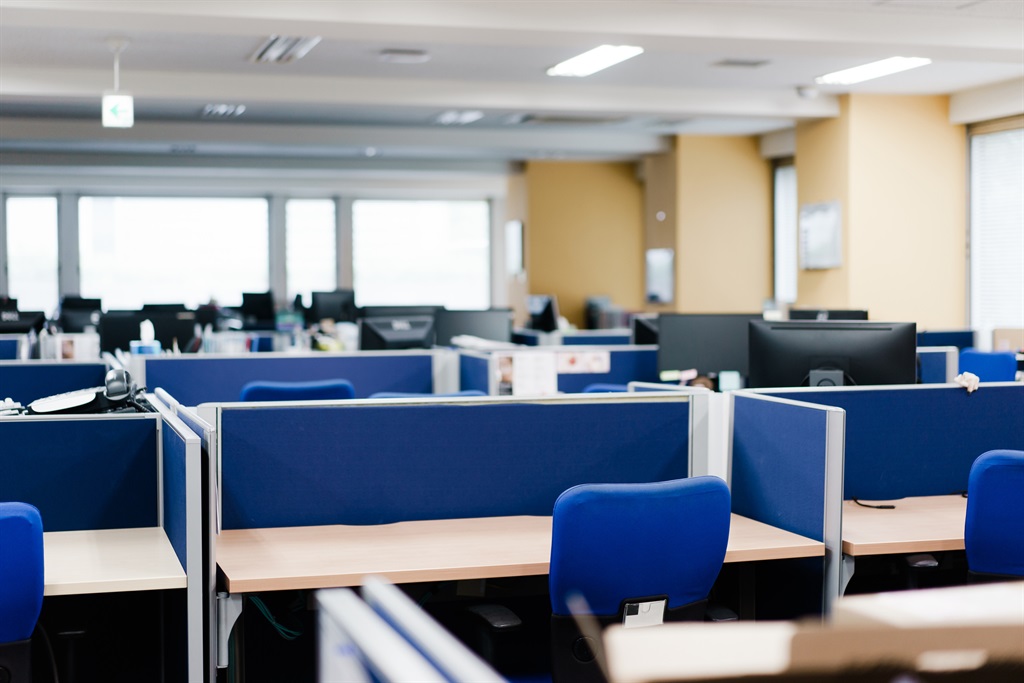
- Emira Property Fund says tenants are spoilt for choice and are taking longer to decide what to do when their leases expire as office vacancies continue to rise.
- Some tenants have started to consolidate their footprint already as working-from-home trends take a more permanent shape.
- There is an oversupply of office space, especially "prime office", but Emira says it has observed among its tenants that people are starting to need human interaction again.
It is becoming a dog-eat-dog world in the office space. The high vacancies that were already becoming a problem before Covid-19, corporates that are undecided about what to do with their space, and falling rental levels are creating a headache for landlords.
Emira Property Fund - which owns smaller shopping centres and office parks around the country and in the US - said on Wednesday its tenants were taking longer to make up their minds: some have already consolidated their office footprint or reducing their lease terms.
Oversupply is creating more problems
"Because of the uncertainty, there's a lack of confidence that impacts leasing decisions. Not only the uncertainty, [tenants] are so spoilt for choice at the moment because of the oversupply," said Emira's chief operating officer, Ulana van Biljon, during the presentation of the company's financial results on Wednesday.
Emira's office portfolio saw vacancies increase by eight percentage points between June and December 2020 to 14.9%. But some office parks had a much greater vacancy rate.
Menlyn Corporate Park had 20% of its space vacant. Hyde Park Lane had 30% unoccupied. Epsom Downs Office Park had a 40% vacancy rate and Albury Park, which is also situated in Hyde park – an area that was regarded a prime location before Covid-19 – had a 43% vacancy rate.
The office space makes up 25% of the company property portfolio.
The company lost few big tenants who have stared consolidating their office footprint or chosen a permanent work-from-home arrangement.
"We did lose a few major tenants and the reasons for losing those major tenants was that most of them consolidated their operations. But we've also seen that there was a slow take-up of space," said Van Biljon.
More office leases are expiring this year, but Emira has renewed some of them and it was confident that it will retain 72% of renewals that came up between October 2020 and June this year.
The South Africa Property Owners' Association's (SAPOA) office vacancy report for the fourth quarter of 2020 also showed that at 13.3%, vacancy rates in SA's office space was the highest since 2004. The association said three out of every 100 office buildings were completely empty. SAPOA also flagged oversupply in "prime offices" segment. Only 48% of prime office buildings were fully let.
Falling rental levels
As if the rising vacancies were not already enough, rental rates have also come under pressure.
"It is under pressure because firstly, other landlords are cutting rentals. And also, in vacancy you can think of there are [rental] incentives," said van Biljon.
She added that built-in contractual increases that happen when leases expire are not possible in many instances right now. Some existing tenants are also requesting to restructure their leasing terms, even before their leases expire, taking out expenses like parking requirements.
That said, many bigger tenants remain cautious about making long-term decisions regarding their office strategies, said Van Biljon.
"They are looking at the effect of working from home. Also, the effects of maybe a more flexible workplace. At the moment, they are not sure how to actually take their office strategies going forward," she said.
Emira however remains optimistic about the future of the office in the long-term because it has seen among its tenants that people need human interactions.
"People need human interaction to collaborate. People need human interaction to maintain the [company] culture, to discuss difficult issues, to be creative. Therefore, we know our workplace requirement will be fluid going forwards and it will change constantly," said Van Biljon.
Retail is doing relatively better, but it's not okay
In the retail space, Emira said tenants were not out of the woods yet, even though that corner of the market was doing relatively better.
In the six months to December, the company provided permanent rental relief to 363 tenants to the value of R17.8 million. These tenants were mostly restaurants, personal care, gyms as well as providers of entertainment and travel-related goods and services.
Van Biljon said looking at turnover statistics of its retail tenants, it was clear that consumers and spending power remained under pressure up to December. Most retail tenants had negative turnover compared to 2019, albeit good performance among tenants such as Clicks and homeware and food retailers.
"The one thing we also see is that people are cautious about visiting public places, and a shopping centre is a public place. The feedback that we are getting on the ground is that consumers visit shopping centres that are more of the convenience and neighbourhood-type of shopping centres," said Van Biljon.
